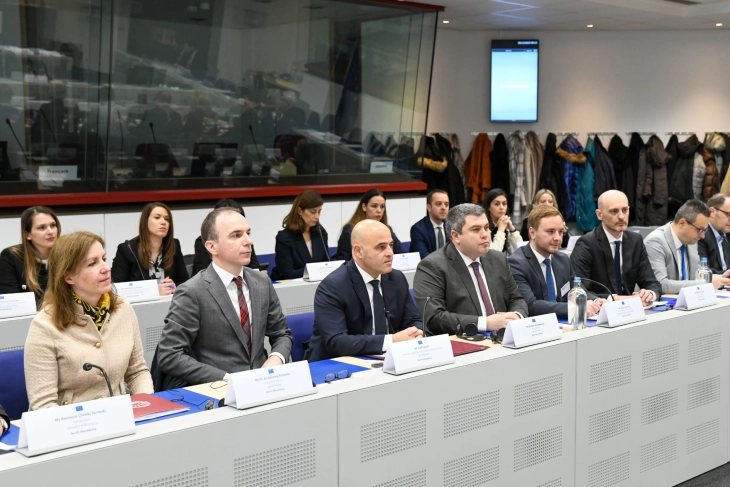Kovachevski in Brussels: Progress on EU path contributes to higher economic growth
- North Macedonia has the highest degree of trade openness in the Western Balkans, reaching 171 percent in 2022, and will not ask for any transitional periods but will fully accept EU law, Prime Minister Dimitar Kovachevski said in Brussels at the opening of the country's screening process final session dedicated to Cluster 6 Chapters 30: External Relations and 31: Foreign, Security and Defence policy.

Skopje, 6 December 2023 (MIA) — North Macedonia has the highest degree of trade openness in the Western Balkans, reaching 171 percent in 2022, and will not ask for any transitional periods but will fully accept EU law, Prime Minister Dimitar Kovachevski said in Brussels at the opening of the country's screening process final session dedicated to Cluster 6 Chapters 30: External Relations and 31: Foreign, Security and Defence policy.
"We will focus on aligning our trade policies with the European Union within the World Trade Organization and will continue implementing EU rules on dual-use export controls, export credits, investments and trade defense instruments as part of our national legal and institutional framework," Prime Minister Kovachevski said.
According to MIA's Brussels correspondent, Chapter 30 focuses on the EU’s common trade policy and multilateral and bilateral agreements with third countries for fair trade and sustainable growth.
The chapter also includes EU rules on conformity assessment, trade defense instruments, foreign policy instruments as well as development policy and humanitarian aid.
Prime Minister Kovachevski said the country's foreign trade was increasingly linked with the European Union, North Macedonia's largest trade partner, with total trade with the EU reaching 60 percent in the past year.
Additionally, he said, 86 percent of the preferential trade agreements that North Macedonia has applied on a bilateral and multilateral basis were with the EU.
"The EU is also the most important investor in North Macedonia and had a share in 65 percent of the total number of foreign direct investments at the end of 2022," PM Kovachevski said.
He said the country ensured greater security in trade relations by supporting the multilateral trade system based on WTO rules contributing to the promotion of open trade and higher economic growth.

Kovachevski recalled that the ratification of the Reference Document for the domestic regulation of services and the Agreement on Fisheries Subsidies was under way, adding that on Oct. 30, North Macedonia became a member of the WTO's Agreement on Government Procurement.
"Regarding development policy, the government has accepted the 2030 Agenda and the sustainable development goals in its national strategic plan, in line with the United Nations Sustainable Development Cooperation Framework 2021-2025 and the EU chapters in the EU accession process," he said.
Kovachevski highlighted that North Macedonia, following the EU's New Agenda for the Mediterranean, became a full member of the Union for the Mediterranean last November. This, he said, was an important political act, aimed at promoting regional cooperation and dialogue.

In his address, Kovachevski also spoke about the alignment of the country's laws with the EU's legislation, noting that amendments and new regulations were already in the works in several areas.
"The Ministry of Economy has already transferred the Kimberley Process Certification Scheme on international trade in rough diamonds and is currently drafting two laws on preventing the death penalty and torture as well as on the control of the export of dual-use items," Kovachevski said. He added that both laws were expected to enter into force by late 2024.
The PM also said the Ministry of Foreign Affairs, as part of its work on aligning humanitarian policy with the EU, had drafted a law on international development cooperation and humanitarian aid, which should be adopted by 2025.
The final session of the screening process was also attended by Deputy Prime Minister of European Affairs Bojan Marichikj and representatives from the Secretariat for European Affairs, the Ministry of Economy, the Ministry of Foreign Affairs, the Ministry of Finance, the Ministry of Environment and Physical Planning, the Customs Administration, and the Public Procurement Bureau.

Closing Chapters 30 and 31 on Thursday will officially end the screening process, which started on Sept. 15, 2022, and included explanatory and bilateral meetings with the EU on all 33 negotiation chapters divided into six clusters.
During this time, 850 presentations were held in Brussels. They were attended by representatives from 206 different institutions in North Macedonia and around 1,000 participants.
The European Commission evaluated the success and timely implementation of the screening process in its annual report on the country's progress by noting a solid level of alignment of the national laws with EU legislation.
After the screening process ends, the country has been invited to prepare roadmaps for the rule of law and for the public administration reform ahead of opening the negotiations under Cluster 1: Fundamentals. It also needs to adopt an Action Plan dedicated to the protection of the rights of persons belonging to minorities or communities. mr/







